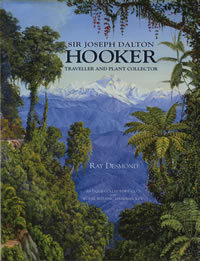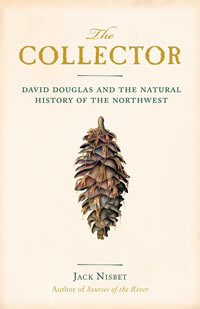 Sir Joseph Dalton Hooker: Traveler and Plant Collector (2001) by Ray Desmond is a marvelous travelogue, masking as a biography. Our hero took two multi-year expeditions (to Antarctica, New Zealand, and Australia from 1839-1843; and to India and the Himalayas from 1847-1851) as well as shorter trips to Morocco, Palestine, and the United States.
Sir Joseph Dalton Hooker: Traveler and Plant Collector (2001) by Ray Desmond is a marvelous travelogue, masking as a biography. Our hero took two multi-year expeditions (to Antarctica, New Zealand, and Australia from 1839-1843; and to India and the Himalayas from 1847-1851) as well as shorter trips to Morocco, Palestine, and the United States.
All the while he was observing, documenting, and collecting plants, leading to the publications of the native floras of these regions. Even better for us today, he was sketching the plants, landscapes, native peoples, and many other attractions. These sketches, and the botanical illustrations made by others from them, make this a richly illustrated book.
The text is engaging, detailing the trials of travel for both man and plants. Hooker “coped remarkably well with the rigours of botanising in the Himalayas. This he attributed to abstinence…a diet of meat and potatoes, and never over-eating.”
“His problems as a plant collector did not cease with the boxing and parceling of plants and seeds. Sometimes they were lost or dropped into rivers on the journey to Calcutta; often they died before they reached the port.” He tried wrapping seeds in “tins, oilcloth wrapping, paper packets. Sometimes he posted them in letters. But…too often they reached their destination damp or rotting or eaten by insects.”
Excerpted from the Spring 2012 Arboretum Bulletin.
 For a total change of pace, pick up Jack Nisbet’s “The Collector.” Although written in the third person, the story-telling is so good that it reads like a memoir by one of the most influential of the early plant explorers to our region. David Douglas was a keen observer of all things in the natural world, but especially the plant kingdom, and had a natural talent for the recording, collecting, and preserving what he found. And what energy! From 1823 until his tragic death in 1834, Scotsman Douglas was almost constantly exploring the new world, risking many hazards of travels and meeting many interesting people in both academic and frontier life.
For a total change of pace, pick up Jack Nisbet’s “The Collector.” Although written in the third person, the story-telling is so good that it reads like a memoir by one of the most influential of the early plant explorers to our region. David Douglas was a keen observer of all things in the natural world, but especially the plant kingdom, and had a natural talent for the recording, collecting, and preserving what he found. And what energy! From 1823 until his tragic death in 1834, Scotsman Douglas was almost constantly exploring the new world, risking many hazards of travels and meeting many interesting people in both academic and frontier life.